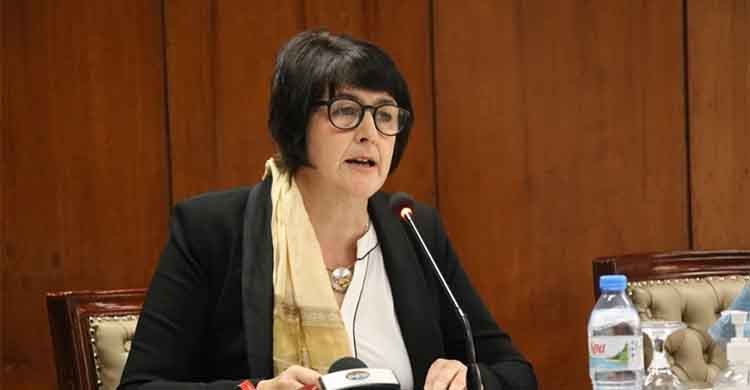UN expert urges Bangladesh to step up efforts to prevent trafficking
09 November 2022, 09:09 pm | Updated: 03 April 2025, 07:47 am

UN Special Rapporteur on trafficking in persons Siobhan Mullally has called for greater accountability and said urgent action is necessary to prevent trafficking, and ensure assistance and protection without discrimination.
The UN human rights expert called on Bangladesh to step up efforts to prevent trafficking in persons, especially for purposes of sexual exploitation, child marriage, and forced labour, and urged authorities to improve rights and protection for victims.
“Child trafficking is a significant risk, which must be addressed through expanded child protection and increased efforts at birth registration. No community should be left behind,” the UN expert said.
She met the media at the city hotel on Wednesday afternoon concluding her 10-day visit in Bangladesh.
The UN expert urged Bangladesh to step up efforts to prevent trafficking particularly for sexual exploitation of persons of diverse gender identities who were at grave risk.
Mullally met with a range of survivors and victims of trafficking during her visit, including those who had been trafficked for sexual and labour exploitation, domestic servitude, child and forced marriage.
Mullally’s visit took her to Dhaka and Cox’s Bazaar, and to refugee camps hosting almost 1 million Rohingya refugees, and to the city of Sylhet.
“More efforts to combat child trafficking is essential, including by improving rates of birth registration for all communities and ending child marriage. We know that the children of sex workers are at great risk, and are often not registered at birth,” Mullally said.
The expert noted that climate change was particularly affecting coastal areas and driving increased displacement and migration to urban centres, and loss of livelihoods.
“This creates increased risks of exploitation, as children and families move, without protection, livelihoods or shelter,” she said.
Mullally commended the government of Bangladesh for hosting nearly 1 million Rohingya refugees at a time when many countries were closing their borders to people in need of protection, and called for more international support to help authorities to ensure their safety and wellbeing.
“The situation in the camps, with no access to employment or formal education and training, and restrictions on movement, had led to increased frustration and risks of exploitation, including through trafficking for purposes of child marriage, sexual exploitation and forced labour,” the Special Rapporteur said.
For Rohingya refugees who are victims of trafficking, the capacity to provide assistance and protection within the camps is limited and must be expanded, said the UN expert.
"Access to durable solutions must be provided, including expanded opportunities for resettlement, and voluntary repatriation in accordance with international law, ” she said.





















